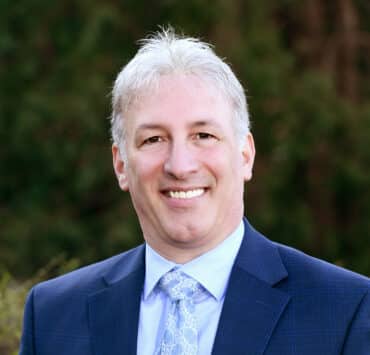If you care about the future of healthcare, you need to have a conversation with Christy Carver because she is slowly building an army of advocates.
Carver, a twenty-six-year veteran of the HR and benefits space and current director of corporate benefits for Cubic Corporation, is not satisfied with the status quo and is willing to give voice to that discontent. Those concerns are especially notable because, in all things, Carver seems so incredibly upbeat, optimistic, and motivated. Negativity as a human trait is about the last thing attributed to her, but this is why anyone in the health and benefits space should be listening.
“The world is what we allow it to be. We need to remember [that] those who want to see healthcare be about truly making people healthy again outnumber those who do not have our best interests at heart,” Carver says. “You might be criticized for speaking up, but you must do so when you know it’s the right thing to do. I want to see people get their lives back, and I don’t want them to be dismissed or overly medicated because it’s the easiest option available. I want to see people smile and thrive again.”
Advertisement
Admit the Problem
That may seem a wide-ranging sentiment, one that needs to be scaled down and specified. But Carver’s scope is exactly the issue. In order to see employees as more than a headcount number, Carver believes benefits and HR leaders and employers need to exercise their power to help create sweeping change in healthcare and benefits.
Carver explains that the current employee experience across the US is one that is completely dependent on pharmaceutical needs. The director is not advocating the suspension of medications for the millions of Americans who need life-saving medications to make their lives better. Instead, she takes into consideration the rates of prescription drug abuse and the pharmaceutical industry’s historically “soft touch” when it comes to writing scripts when making her point.
“So often, it seems like we’re putting a Band-Aid on a Band-Aid on a Band-Aid,” the director says. “What happened to living up to the word ‘healthcare?’ We are used to seeing a doctor for five to ten minutes, getting a prescription, and then we’re on to the pharmacy. It’s only then that we find out about the side effects and potential prisons we’re creating for ourselves. Often, we’ll need another script to try and mitigate the damage we’re doing with the last one.”
That is why Cubic has placed such a high importance on value-based care. Carver says lifestyle change can often displace the need for a prescription, and those lifestyle changes create healthcare advantages far down the road. She’s seen it personally.
“On both the musculoskeletal and diabetes front, I have seen not just mitigation, but reversal. So, no one can tell me it can’t be done. We just need to start demanding more from the market and the industry. I challenge benefit leaders to consider which brokers and consultants they work with,” Carver says. “I partnered with McGriff a few years back because I liked their progressive thought process, strong data analytics, and their appetite to help me aggressively manage cost through creative solutions that add to the employee experience. If your broker is telling you to prepare for 10 percent trend and they are not doing anything to help you offset that trend, it’s time to find a new broker.”
“Christy is a driven, passionate leader in the field, and willing to be innovative and challenge the status quo,” says Douglas King, McGriff Insurance Services benefits consultant. “It’s been wonderful to partner with her to address the issues facing Cubic and to recommend solutions that deliver on those needs.”
The Right Kind of Change for the Right Kind of Reasons
Cubic has partnered with Virta Health to not just treat diabetes, but in many cases, to reverse it. Carver says the business of merely treating diabetes is bigger than ever, but it’s partners like Virta who are seeking out the best possible outcomes for patients. Virta is a virtual clinic for reversing type 2 diabetes, prediabetes, and obesity. Virta reverses these conditions through a combination of nutritional therapy and virtual care focused on lasting behavioral change and safe medication deprescription. Their results are clinically validated, and they are helping to change lives across the nation.
On a similar front, Carver points to Cubic’s partnership with Hinge Health. The US is still in the grips of a culture that (inadvertently or otherwise) has managed to get a sizable portion of its populace addicted to prescription painkillers.
“Hinge Health offers virtual physical therapy, so even if you’re in a remote location, you have access to treatment as much as you need it,” Carver says. “This kind of treatment can combat chronic pain and often prevent the need for surgery down the line. Again, if I hadn’t talked with people whose lives have been changed by these solutions, I wouldn’t feel so strongly about advocating their value.”
Carver also cites cancer detection company Grail and value-based healthcare organization Carrum Health as companies she’s currently exploring.
“If you get cancer and have to go through treatment, Carrum has warranties in place to make sure you have successful outcomes,” Carver says. “We can actually start controlling healthcare spend and get in front of where the industry is trying to take us regarding cost while giving our employees a white glove service during one of the most difficult times in their life. It’s an incredible model.”
Carver has been driving this kind of innovation at Cubic and with the providers she works with. Despite a long-term partnership with Cigna, Carver informed the organization that if they were not able to provide alternative healthcare along with traditional care, she would need to go to market to find a point solution to fill this gap.
“Cigna has been incredible,” Carver explains. “We have employees who want to seek out naturopathic care solutions along with some more traditional options. Cigna pivoted as quickly as we needed them to, and they expanded their naturopathic network of doctors. I give them a lot of credit for meeting us where we are and helping us with innovative solutions. I truly value them as a strategic partner.”
Your First Step
You may have felt these feelings in your organization. This knowledge that the healthcare system in the US is broken, that things should not be this way, and that something needs to change. But we aren’t all Christy Carver. So, where do we start?
Carver has begun speaking at conferences and conventions on the subject. And she hopes people will be willing to make their own voices heard.
“We need to start taking the risk,” Carver says. “I was a little nervous to talk about this at a recent conference, but people started applauding because they understand just how critical the need for change is. We’re up against some very wealthy and powerful organizations that are using the healthcare industry for gain, but if we join together and begin to advocate for true health outcomes for our employees and their families, we can change the future of healthcare.”
She continues to advise, “Talk with people you know in the industry. Create a standing meeting to talk about your challenges and how you can help each other. You don’t have to write an editorial tomorrow, but the more we come together to understand that we are not alone, the more we can collectively demand change.”
Carver doesn’t blame overburdened healthcare organizations, or the market’s call to create a product to solve a problem. It’s the mess that exists despite the well-meaning scientists or overworked healthcare workers. They are victims of the same system. Carver says they owe it to their employees to advocate for better health outcomes and they owe it to their organizations to be innovative in their approach to reducing costs. As they advocate for this needed change in healthcare, they may be met with some resistance, but no one said changing the future of healthcare would be easy.
Carver is speaking from personal/professional experience, not as a spokesperson for Cubic.
McGriff Employee Benefits provides innovative products and services to help organizations manage costs, drive employee engagement, and allow HR more time for strategic initiatives. With deep expertise in both fully insured and self-funded plans, we offer plan design recommendations, funding analysis, carrier negotiations, proposal analysis, and the selection and implementation of employee benefits programs. We’ll help craft a strategy to identify and engage the high-risk, high-cost employees in your population. McGriff is proud of the partnership we’ve forged with Christy Carver and Cubic Corporation. If you’re also looking for a collaborative benefits partner, reach out to Douglas King at Douglas@McGriff.com.
Cigna HealthcareSM is a health benefits provider that advocates for better health through every stage of life. We guide our customers through the healthcare system, empowering them with the information and insight they need to make the best choices for improving their health and vitality. We are honored to support the incredible efforts of Christy Carver and the Cubic organization to elevate the well-being of their workforce through the intentional investment of time, resources, and a long-term commitment to cultivating a thriving workplace environment. Legal disclosures.


